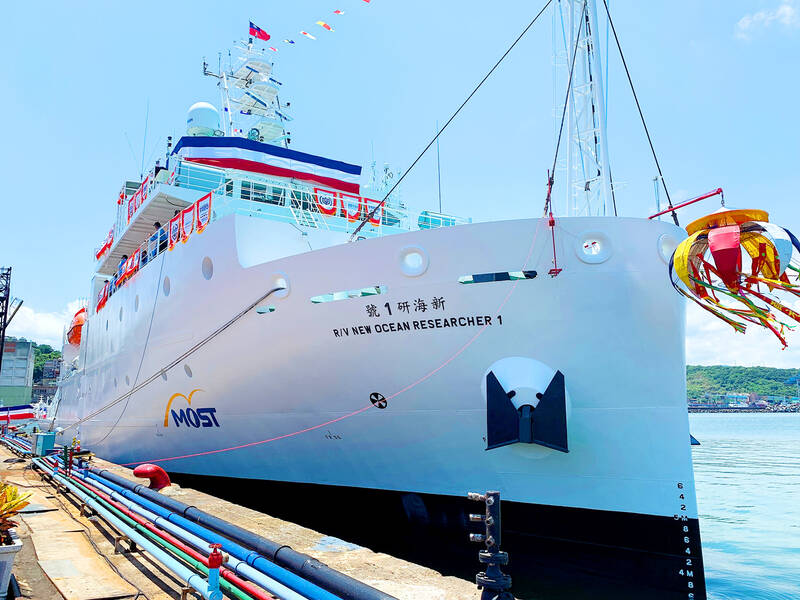The National Science and Technology Council said it would hold meetings with national security and coast guard officials before dispatching research vessels, after a legislator revealed that there have been 11 territorial conflict-related incidents involving research vessels over the past five years.
As Taiwan’s exclusive economic zone overlaps with those of other countries, including China and Japan, its research vessels are occasionally driven away by those countries’ coast guard ships.
At a legislative budget hearing on Wednesday, independent Legislator Huang Kuo-shu (黃國書) asked the council about its plan to handle harassment of research vessels.

Photo: Lin Hsin-han, Taipei Times
One incident occurred in late September when National Taiwan University-operated New Ocean Researcher 1 (新海研一號) was conducting research off eastern Taiwan, Huang said.
Believing it was operating in Japan’s exclusive economic zone, a Japanese coast guard ship issued a warning to the vessel, he said.
The Taiwanese coast guard sent its 500-tonne Hualien patrol boat as a precautionary measure, resulting in a 10-hour standoff, he added.
After the incident, the Chinese Ministry of Foreign Affairs made representations to Tokyo asking it not to interfere with “China’s research work,” Huang said.
Calling the incident “embarrassing,” Huang asked council Minister Wu Tsung-tsong (吳政忠) to respond, as well as restart the Taiwan-Japan Maritime Affairs Cooperation Dialogue.
Wu reiterated that China had no right to raise representations with Japan over the incident.
As a Taiwanese coast guard vessel arrived on the scene, Wu said he assumed that foreign affairs and national security personnel resolved the matter.
The annual Taiwan-Japan maritime dialogue has halted for nearly two years due to the COVID-19 pandemic, although it should restart now that the borders have opened, he added.
Huang said Taiwanese research vessels have been harassed by foreign ships 11 times over the past five years, citing council data.
In two incidents, the vessels were pursued by Chinese ships within 1 nautical mile (1.85km), he added.
Even a joint research project with the Philippines encountered harassment by Chinese ships, Huang said, adding that the Philippine government handled the issue.
Beijing’s increasingly aggressive gray area tactics have caused neighboring countries to raise their guard, affecting Taiwanese maritime research, Huang said, urging the government to review its navigation and notification mechanisms.
Wu said that incidents are not handled by the council alone, but in cooperation with the National Security Council, the coast guard and other agencies.
He vowed that that National Science and Technology Council would hold meetings with other agencies before research vessels are dispatched, to clarify the vessels’ tasks and procedures.

Chinese spouse and influencer Guan Guan’s (關關) residency permit has been revoked for repeatedly posting pro-China videos that threaten national security, the National Immigration Agency confirmed today. Guan Guan has said many controversial statements in her videos posted to Douyin (抖音), including “the red flag will soon be painted all over Taiwan” and “Taiwan is an inseparable part of China,” and expressing hope for expedited reunification. The agency last year received multiple reports alleging that Guan Guan had advocated for armed reunification. After verifying the reports, the agency last month issued a notice requiring her to appear and explain her actions. Guan

GIVE AND TAKE: Blood demand continues to rise each year, while fewer young donors are available due to the nation’s falling birthrate, a doctor said Blood donors can redeem points earned from donations to obtain limited edition Formosan black bear travel mugs, the Kaohsiung Blood Center said yesterday, as it announced a goal of stocking 20,000 units of blood prior to the Lunar New Year. The last month of the lunar year is National Blood Donation Month, when local centers seek to stockpile blood for use during the Lunar New Year holiday. The blood demand in southern Taiwan — including Tainan and Kaohsiung, as well as Chiayi, Pingtung, Penghu and Taitung counties — is about 2,000 units per day, the center said. The donation campaign aims to boost

The Kaohsiung Tourism Bureau audited six hotels in an effort to prevent price gouging ahead of Korean band BTS’ concert tour in the city scheduled for Nov. 19, 21 and 22 this year. The bureau on Friday said that the audits — conducted in response to allegations of unfair pricing posted on social media — found no wrongdoing. These establishments included the local branches of Chateau de Chine, Hotel Nikko, My Humble House, and Grand Hai Lai, it said, adding that the Consumer Protection Commission would have penalized price gougers had the accusations been substantiated. The bureau said the Tourism Development Act

The military yesterday said it has located the flight data recorder, or black box, of an F-16V jet that disappeared off eastern Taiwan earlier this month, and it would soon deploy a salvage team to try to retrieve it. Air Force Command Headquarters said that while it had pinned down the location of the black box, it was still searching for the aircraft’s sole pilot, air force Captain Hsin Po-yi (辛柏毅). Without providing details, the air force said it had located the black box days after detecting some intermittent signals and would now engage a team of professionals to retrieve it. The air